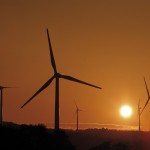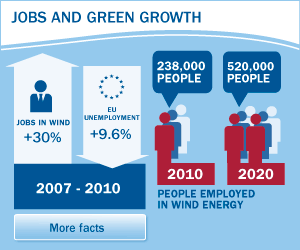 Wind energy doesn’t usually see much support from UK newspaper the Daily Telegraph, but this weekend the paper published a story based on National Grid (the UK’s electricity grid operator) evidence proving that wind farms do not need fossil fuel back-up for when the weather is calm.
Wind energy doesn’t usually see much support from UK newspaper the Daily Telegraph, but this weekend the paper published a story based on National Grid (the UK’s electricity grid operator) evidence proving that wind farms do not need fossil fuel back-up for when the weather is calm.
“The National Grid has studied what actually happens in practice, with explosive, if surprising, results,” the paper said. “Between April 2011 and September 2012…wind produced some 23,700 gigawatt hours (GWh) of power. Only 22 GWh of power from fossil fuels was needed to fill the gaps when the wind didn’t blow. That’s less than a thousandth of the turbines’ output – and, as it happens, less than a tenth of what was needed to back up conventional power stations.”
That statement highlights another perhaps little known fact – fossil fuel power stations do need back-up. A fossil fuelled power station needs to shut down for repairs or maintenance taking many gigawatts of power offline with it.

Thomas Becker, EWEA CEO.
“Gas, coal and nuclear have more political clout than the wind industry”, and the industry has to take a “more visible place in the political landscape.”
So writes EWEA’s new CEO Thomas Becker in the latest Wind Directions.
“The big boys did not see nice ‘alternative’ wind as a threat. Now they do. As old power plants face closure the competition between technologies to fill the gap is intense.
Becker calls for European and national associations to “speak with one voice.”
“Gone are the days when economic growth made expansion easy for all technologies. The associations of the wind industry need to big up – like turbines have. Like the grid we need to be better interconnected: European and national associations must work together much more closely to shape national government and EU energy policy.”
Read the full article in the latest Wind Directions

French Environment Minister Delphine Batho
Writing in France’s prestigious centre-left daily newspaper Le Monde, Peter Altmaier, the German environment minister, and Delphine Batho, his French counterpart, underlined the need for a 2030 renewable energy target and highlighed the importance of renewables in transforming the European economy, improving energy security and reducing greenhouse gas emissions.
“We want to make the energy transition [moving to produce a significant amount of electricity from renewables] the new motor of the Franco-German couple,” stated the letter. It noted that the two countries recently decided to create a joint renewable energy office that will focus on promoting cooperation between companies, and on encouraging political and scientific collaboration on renewables.
France is aiming to reduce the share of nuclear in its electricity production from 75% to 50% by 2025, to increase the country’s energy efficiency by around 20%, and by 2020 to produce around 23% of electricity from renewables, according to Ms Batho. Germany, meanwhile, wants by 2022 to no longer produce any energy from nuclear power and by 2030 to produce at least 50% of its electricity from renewables.

Thomas Becker, EWEA CEO.
Commenting on the call from BusinessEurope Director General Markus J Beyrer on EU energy policy, European Wind Energy Association CEO Thomas Becker had this to say;
It sounds a little old fashioned when BusinessEurope claims that fighting climate change is not compatible with cost-competitiveness and security of supply. What have they been doing for the last 15 years? What planet were they on?
The main problem of the energy situation today in Europe is the massive subsidies – still in 2013 – going to fossil fuels and nuclear.
If that was corrected and with a properly functioning electricity market there would be no discussion of what choice policy makers would make for the energy mix.
But even without such a correction, wind energy is already cheaper than nuclear, and in an increasing number of locations already cost competitive with new gas and coal.
 If all the costs of fossil fuel power generation were detailed in German power bills they would exceed the costs of renewable energy “by a wide margin”, a study by Greenpeace Energy Germany and the German Wind Energy Association (BWE) says.
If all the costs of fossil fuel power generation were detailed in German power bills they would exceed the costs of renewable energy “by a wide margin”, a study by Greenpeace Energy Germany and the German Wind Energy Association (BWE) says.
Currently German power bills clearly outline the cost of the EEG – the support that is channelled to renewable energy and charged to the consumer as a levy – but the costs of conventional fuels are hidden. “State incentives for nuclear and coal are sometimes part of rules that increase the price of power and sometimes part of government budgets. In both cases consumers cannot directly see the full cost in their power bills,” the report says.
In 2012 the EEG levy cost the consumer €c3.59 per KWh, while the report estimates that if there were a similar levy for fossil fuels it would cost €c10.2 per KWh – almost three times as high as the EEG.
 Wind energy doesn’t usually see much support from UK newspaper the Daily Telegraph, but this weekend the paper published a story based on National Grid (the UK’s electricity grid operator) evidence proving that wind farms do not need fossil fuel back-up for when the weather is calm.
Wind energy doesn’t usually see much support from UK newspaper the Daily Telegraph, but this weekend the paper published a story based on National Grid (the UK’s electricity grid operator) evidence proving that wind farms do not need fossil fuel back-up for when the weather is calm.






 Comments
Comments


